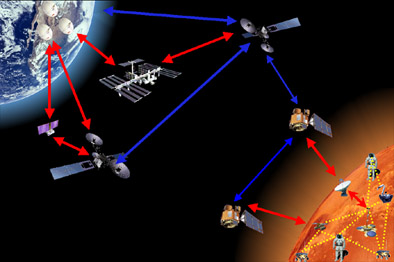IMPORTANT: This is a draft. The final document may differ significantly from the current version. | |
Abstract: Increasingly, network applications must communicate with counterparts across disparate networking environments characterized by significantly different physical and operational constraints than what we find in today's Internet. In general, these environments share a common inability to establish and maintain a low-loss, low-latency, end-to-end communication session. Yet, it is precisely the ability to maintain such a session that is required by most existing Internet-style protocols. We will study the fundamental principles that underlie a delay-tolerant networking (DTN) architecture, that is suitable for the future Interplanetary Internet (as an extreme case) but also for "extreme situation networks" on planet earth (e.g. in developing regions with limited power and telecommunication infrastructure, or, in natural disaster areas).
| 
http://www.ece.gatech.edu/research/labs/bwn
|
Synopsis:- Seminar, Praktische Informatik, Hauptstudium.
- 2h each week, over one semester (2 SWS).
- Target Audience: Students who are interested in "Challenged Internetworks" - Which (try to) apply Internet technology for inter-planetary communication and also in disparate environments on earth.
How the seminar will be conducted: This is experimental; if it does not work, we'll switch back to the traditional model (see last semester's seminar on "peer-to-peer networks"). In addition to the technical (computer science) matter, it is the goal of this seminar that you learn to speak in front of an audience, learn to convey ideas effectively, learn to accept feedback from the audience and use it to improve your work (here: your presentation). The purpose of the "elevator presentation" is to (try to) express a great idea in a very short time - a skill that is certainly useful in your future professional life (it also gives your fellow student's an idea what's to come).
- Topics will be firmly assigned to interested students during the first meeting (April 20th)
- No meeting in 2nd week - you will be busy with homework :-)
- During the next two meetings, every student (presenter) gives a 15 minutes elevator presentation (summary preview) of his/her topic. The audience will provide feedback regarding style and content.
- In the following 8 weeks we'll have presentations; 1 or 2 peer meeting. Presentations will be evaluated by two members of the audience at the end of each class (Bewertungskriterien-Seminarvortrag.pdf).
- Presentations may be given in English or in German. All documents are in English (exceptions may be granted). A PowerPoint template can be obtained here .
- Presenters summarize their presentation and relevant discussion on the Seminar's WIKI page within 2 weeks.
- To obtain credits for this seminar, you are expected to attend regularily.
Prerequisites: - Successful completion of PI-1,2,3.
- Completion of at least one seminar/lecture/project-seminar in the general area of "Communication Networks" (e.g., lectures offered by Dr. Sommer, Prof. Redlich).
- Advanced knowledge of the protocols IP (addressing, Internet Routing), and TCP (window-based congestion control). Basic knowledge of ad-hoc wireless mesh-networks.
Wiki: Syllabus:- Interplanetary Internet - Introduction / State of the Art / Architecture Overview
- Interplanetary Transport Protocols
- DTN as a generalized messaging service
- DTN Architecture Overview
- DTN Routing (1): Epidemic Routing / Controlled Flooding
- DTN Routing (2): Probabilistic / Un-Planned / Unknown Connectivity Patterns
- DTN Routing (3): Planned / Scheduled / Known Connectivity Patterns
- DTN Multicasting
- Network Coding for Efficient Communication
- Data Retrieval in Intermittedly Connected Networks
- Self-Organization Principles
- Localization Services
- Under-Sea Communication
- Tetra, Tetrapol
- Security in DTN
Assignments (Themenvergabe): | Date | Presenter | Topic | Slides | | 20.Apr | Jens-Peter Redlich | Introduction | pdf | | 27.Apr | no meeting | No Class - You'll prepare your elevator presentations | | | 04.May | Nordhausen, Nagel (2)
Möbius, Altschudjian (5)
Holzhauer, Cremerius (6) | 1st half of elevator presentations | | | 11.May | Beier, Neukirchen (10)
Kunze, Otto (9)
Semmler, Keller (12)
Herkt, Kühn (15) | 2nd half of elevator presentations | | | 18.May | Nordhausen, Nagel | 2: Interplanetary Transport Protocols | pdf | | 25.May | - | Himmelfahrt (National Holiday) | | | 01.Jun | Möbius, Altschudjian | 5: DTN Routing (1): Epidemic Routing / Controlled Flooding | | | 08.Jun | Holzhauer, Cremerius | 6: DTN Routing (2): Probabilistic / Un-Planned / Unknown Connectivity Patterns | | | 15.Jun | Carstensen | Regelmässige Bewegungsmuster | pdf | | 22.Jun | Beier, Neukirchen | 10: Data Retrieval in Intermittedly Connected Networks | pdf
pdf | | 29.Jun | Kunze, Otto | 9: Network Coding for Efficient Communication | | | 06.Jul | Maria Tsitiridou | 8: DTN-Multicasting | pdf | | 13.Jul | Herkt, Kühn | 15: Security in DTN | | | 20.Jul | no meeting | no meeting | |
Glossary | | DTN | ... | (1) Delay Tolerant Network
(2) Disruption Tolerant Network | | | IPNI | ... | InterPlaNetary Internet | | | ICN | ... | Intermittently Connected Network | | | LEO | ... | Low Earth Orbit (satellite) | | | FEC | | Forward Error Correction |
| |
|

